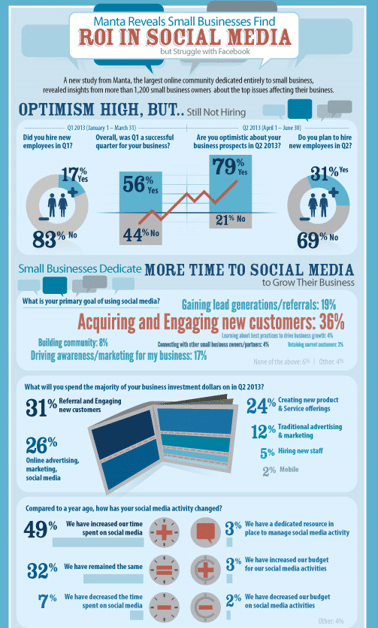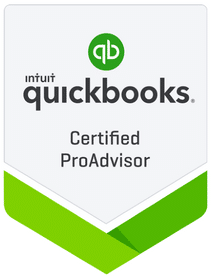- Patrick Roney
- (877) 503-8607
Follow Us :
Follow Us :
Proledge
April 18, 2013

“As a highly pragmatic and time-constrained group, small business owners are strategically adopting platforms that show real results for their business,” said Pamela Springer, CEO of Manta. “However, social media is not a stationary phenomenon. As SMBs shift from the experimental stage to a results-focused phase, their social media usage will evolve to maximize the value.”
According to a recent small business study conducted by Manta, more than half of the 1,200 small business owners surveyed boasted of a fruitful Q1 and 79% are optimistic about Q2. The optimism isn’t translating into new hires, but rather an increase in social media efforts, online advertising and marketing.
The number one goal of the small business owners in this study (in regards to social media) was to acquire and engage new customers. Other important factors were gaining lead generations/referrals, as well as, driving awareness and marketing their business.
If any of these goals sound familiar, maybe it’s time to take a closer look at your company’s social media marketing plan (or lack thereof).
If you’re still on the fence about taking the social plunge or you’ve established accounts on various platforms like Facebook, Twitter, LinkedIn and Pinterest, but just haven’t done much with them, below are a few things to consider.
Social media participation is free and offers small businesses an opportunity to communicate directly with potential customers in real-time.
Unlike other forms of advertising, social media takes daily effort and attention. But, if done right, can offer useful market research. If you or someone at your company doesn’t have the knack or time for the social-side of the biz, there are companies and individuals that can maintain the platforms for a nominal monthly fee. Consult your bookkeeper about using QuickBooks to create a budget to determine if there’s room for a social media-marketing specialist on the payroll.
Understand what you want to get out of social media and whom you are targeting before you get into it. Determine what “social success” means to you. This will help keep your posts focused, concise and aimed at the right audience. These goals will also clarify which platforms will serve you best (e.g. You might discover that image-based social platforms like Pinterest and Instagram do a better job at highlighting your goods or services.).
You might only have a modest number of followers on Facebook, but you’ll find the ones you do are loyal, repeat customers. Don’t consider your Facebook page a failure if you only have 75 fans. Provide those 75 fans with engaging content, special offers and inside information. They are your VIP customers and their repeat business and referrals will help your business (and Facebook page) grow in popularity.
Put yourself in the consumers’ shoes. Don’t bombard them with discounts and special offers every day of the week and most certainly not multiple times per day. Your message loses its meaning and becomes annoying. Two to three total posts per week will be sufficient. And don’t forget to educate, entertain and inform your consumers along the way. Give them something they won’t easily find elsewhere. Aim to offer a social experience indicative of your brand.
There’s a lot of trial and error involved… for everybody, so don’t think you’re alone! Just keep posting. Tweak your messaging and platforms until you find the formula that works for you.
It does take time and effort to do it right, but it’s worth it. Today’s generation of consumers take to the web before they make purchases, and a large part of the consideration process is social, peer-based referrals. So, take the time to make sure you’re part of the conversation.
Extra reading: Small business social media success story


Fill out the form below to sign up to our Blog Newsletter and we’ll drop you a line when new articles come up.
Bookkeepers.
Professional. Affordable.
ProLedge is a bookkeeping services firm.
Copyright © 2024 All rights reserved.